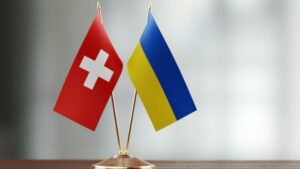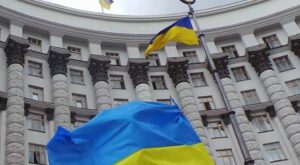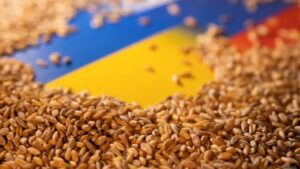
The mining and metallurgical group Metinvest intends to receive compensation from Russia for the enterprises destroyed by the war and direct it to the development of Ukrainian assets.
“We should get full compensation for the damage from the Russians and reinvest it in restarting Ukrainian plants,” Metinvest CEO Yury Ryzhenkov said on the air of Ian King Live on Sky News in Britain.
According to him, the company helps Ukraine defend itself against Russian attacks. He also shared the latest news about the current activities of the group’s enterprises and presented a steel bracelet “Azovstal. Symbol of indestructibility”, a joint project with UNITED24 presidential charity platform to raise funds for the Armed Forces of Ukraine. Metinvest’s participation in the project is part of Rinat Akhmetov’s Steel Front militarized initiative.
“From the first days of the full-scale invasion, both of our shareholders (Rinat Akhmetov and Vadim Novinsky) decided that the company should support the Armed Forces of Ukraine. Therefore, in addition to using our equipment to create a defense line, we developed new ways to produce armored steel, which is now used in body armor. We have supplied the Ukrainian Army and Territorial Defense with over 150,000 body armor. We have also developed new steel mobile shelters that can be used in the field to heat and protect the military from shelling,” said the top manager.
In addition, the group purchases and supplies the army with vehicles, armored vehicles, thermal imaging cameras, radios, etc. A large number of vehicles and equipment needed by the Ukrainian defense forces in the field.
Answering the question about what major assets of the company are now operating in Ukraine, the General Director stated that at present the group has two metallurgical plants in Ukraine: one in Zaporizhzhya and the other in Kamensk. Both of them are in operation now and their capacities are about 50-60% loaded. The company may produce armored plates, steel shelters, etc.
As for the group’s foreign assets, they experienced some difficulties at first mainly because they relied on semi-finished products from Azovstal to operate.
“Since then we have diversified our sources of supply of semi-finished products. For example, here in the UK, slabs are now supplied by British Steel, ThyssenKrupp. In Italy it is ADI. We have found different suppliers that can provide the volumes we need,” said the CEO.
According to him, everyone in the U.K. is working under the same conditions. And the steel industry is as competitive as it can be.
“But when it comes to support, and we’re all colleagues, we understand how we can support each other in the industry,” Ryzhenkov said.
Asked about the situation in Mariupol, which is under occupation, he said the group knows little about what is happening in Mariupol right now.
“There are still quite a few people there, but they can’t say much about what’s going on in the city. As far as I understand, the power supply is unstable, there is no water, no heating, there is a humanitarian disaster in the city right now,” the head of the company explained.
And again expressed confidence that there will be compensation for the destroyed plants.
“We are confident that we should receive full compensation for the losses from the Russians and reinvest it in the Ukrainian plants to resume their work,” the top manager summarized.
“Metinvest is a vertically integrated group of mining and metallurgical enterprises. The enterprises of the group are mainly located in Donetsk, Luhansk, Zaporizhia and Dnipropetrovsk regions.
The major shareholders of the holding are SCM Group (71.24%) and Vadim Novinsky’s Smart Holding (23.76%) that manage it jointly.
Metinvest Holding LLC is the management company of Metinvest Group.
COMPENSATION, DEVELOPMENT, METINVEST, RUSSIAN FEDERATION, Ukrainian plants

The Ministry of Foreign Affairs of Ukraine is working to protect the interests of Ukrainian citizens located on the territory of the Russian Federation, in particular, citizens illegally taken out of the territories temporarily occupied by the Russian army, Ukrainian Foreign Ministry spokesman Oleg Nikolenko said.
“As you know, there are no Ukrainian diplomatic institutions on the territory of the Russian Federation. On behalf of the President of Ukraine, the Ministry of Foreign Affairs reached an agreement in principle with Switzerland on representing Ukrainian interests on the territory of Russia. The choice in favor of Switzerland was made because of its extensive experience in performing such functions, and we are grateful to the Swiss government for their readiness to provide their good services,” Nikolenko said in a comment published by the press service of the Ukrainian Foreign Ministry.
He noted that the modality of representing the interests of Ukraine in the Russian Federation by Switzerland will be determined by a bilateral agreement. At the same time, according to the Vienna Convention on Diplomatic Relations, the receiving party must provide consent for Switzerland to represent Ukraine’s interests in Russia.

The Cabinet of Ministers of Ukraine has approved a draft presidential decree on the confiscation of 903 objects that belong to the Russian state, Prime Minister Denys Shmygal said.
“As promised, we are taking Russian assets for the benefit of Ukraine and the Ukrainian people. We are doing this systematically in accordance with all procedures. We do not replace the law with our desire, but we are implementing this strategic task in a legal way. The confiscated assets are converted into funds used for our defense and restoration,” Shmyhal said at a government meeting on Friday.
According to the prime minister, the government has decided to confiscate Russian property and assets in Ukraine. In particular, a draft presidential decree was approved, which proposes the confiscation of 903 objects that belong to the Russian state.
According to Shmyhal, 79 items are corporate rights, 824 items are property.
“The list of objects has been formed: these are hundreds of buildings, corporate rights, land plots and financial assets. All property is divided into three categories: the first is property that belongs to the Russian state, the second is assets that belong to sanctioned citizens and companies from Russia, the third are the assets of Russian banks,” he added.
The Prime Minister stressed that such a decision is the first step, followed by the confiscation of Russia’s assets in the West.

Ukraine, Turkey and Russia, with the support of UN Secretary General António Guteres, agreed to facilitate safe shipping for the export of grain, related food products and fertilizers (including ammonia) from the seaports of Odessa, Chornomorsk and Pivdenny within 120 days from the possibility of extending this period.
The corresponding signing of documents within the framework of the initiative for the safe transportation of grain and food from Ukrainian ports took place in Istanbul on Friday: the Minister of Infrastructure of Ukraine Oleksandr Kubrakov, in the presence of Turkish President Recep Tayyip Erdogan, signed a tripartite document with Turkish Defense Minister Hulusi Akar and the UN Secretary General, who also signed a second such a tripartite document with Russian Defense Minister Sergei Shoigu.
As noted in the text of the initiative, a copy of which is available to the Interfax-Ukraine agency, it is based on agreements between the parties to the 1974 international convention on the safety of life at sea.
In particular, the parties agree on the following:
– maximum security guarantees for all vessels participating in this initiative;
– creation under the auspices of the UN in Istanbul of a joint coordination center (JCC), which includes representatives of all parties;
– Creation and work on the ships participating in the initiative of inspection teams from representatives of the parties, which will inspect the ships in the ports designated by Turkey, when entering / leaving the Turkish Strait to check the absence of unauthorized cargo and personnel on board.
At the same time, all activities in Ukrainian territorial waters will be under the control and responsibility of Ukraine.
The parties will not launch any attacks on merchant and civilian vessels, as well as on port facilities participating in this initiative.
If clearance of approaches to ports is required, a minesweeper from a third country must be involved
Merchant vessels must be pre-registered with the SKC and will be under technical control for the duration of their passage through the maritime humanitarian corridor agreed by all parties.
The RCC will develop and disseminate a detailed operational and communications plan, including the identification of safe havens and medical assistance options along the route.
In order to prevent provocations and incidents, the movement of vessels transiting the maritime humanitarian corridor will be remotely controlled by the Parties.
“No warships, aircraft, unmanned aerial vehicles (UAVs) can approach the maritime humanitarian corridor closer than the distance agreed by the RCC without the permission of the RCC and only after consultation with all Parties,” the text of the initiative emphasizes.
This initiative will be valid for 120 days from the date of signing by all Parties and may be automatically renewed for the same period, unless one of the Parties notifies the other of its intention to terminate the initiative or change it.
At the same time, the achievement of an agreement on the export of Ukrainian grain does not mean a weakening of the security regime in the Black Sea, representatives of Ukraine have repeatedly emphasized.
CHORNOMORSK, EXPORT, GRAIN, ODESSA, PIVDENNY, PORT, RUSSIAN FEDERATION, TURKEY, UKRAINE
The EU is preparing the next wave of sanctions against the Russian Federation, President of the European Commission Ursula von der Leyen has said.
“We can never match the sacrifice of the Ukrainian people, never can we match that, but we are mobilizing our economic power to make Putin pay a very, very heavy price. We have as you said imposed five waves of unprecedented sanctions against Russia and we are already preparing the next wave,” von der Leyen said at a press conference with Ukrainian President Volodymyr Zelensky in Kyiv on Friday.